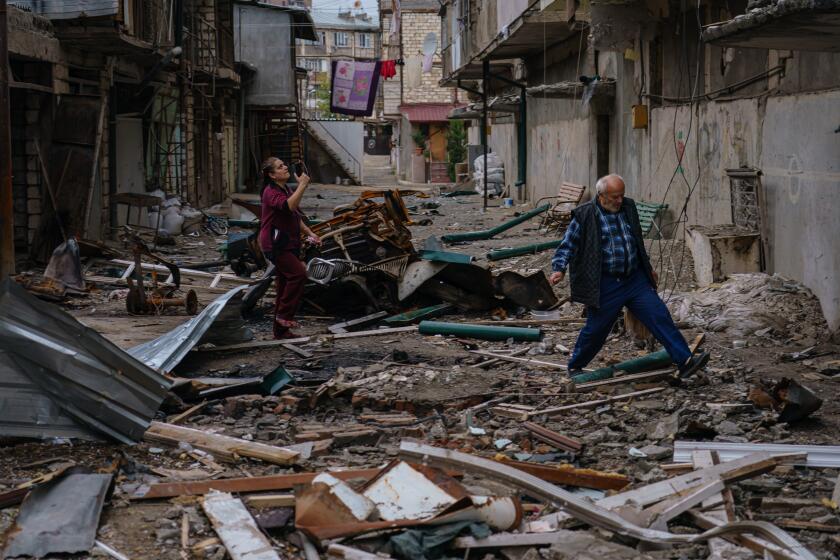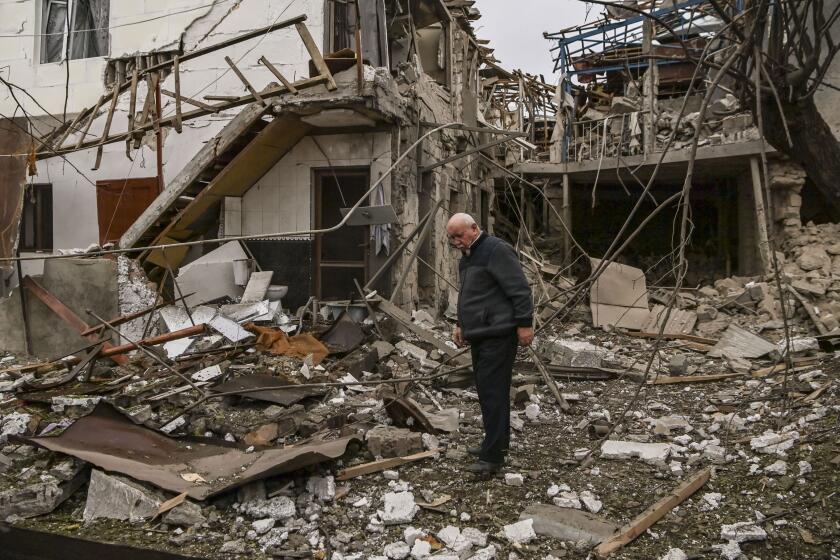War uprooted them. Now it gives these Azerbaijanis hope
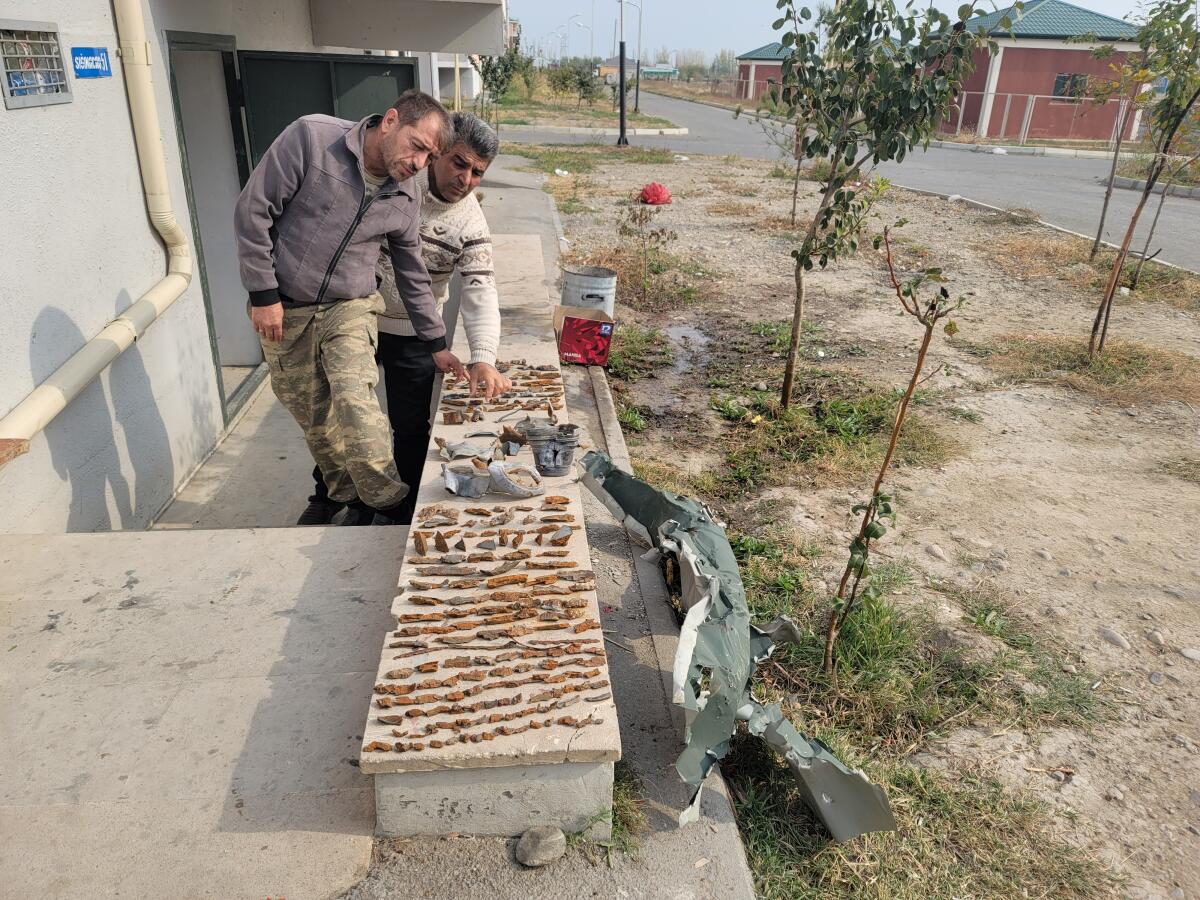
- Share via
BARDA, Azerbaijan — Standing in the classroom where he now lives, Riza Hassanov speaks with bitterness of the conflict that has twice displaced him.
“This war — it made me look old. We have only one demand: to get rid of the Armenians who made our lives like this,” he said, his stooped frame and lined face belying his 57 years.
Hassanov was a young man in the 1990s when Azerbaijan and Armenia first fought over the mountain region known as Nagorno-Karabakh, an ethnic Armenian enclave internationally recognized as part of Azerbaijan. A bruising defeat saw Azerbaijan lose control of Nagorno-Karabakh — along with seven districts surrounding it, including Kalbajar, where Hassanov lived — and the expulsion of 800,000 Azerbaijanis.
After 13 years in a tent encampment, Hassanov moved to a house supplied by Azerbaijan’s government in Dordyol 1, a settlement near the village of Tezekend. Now, that house, too, lies destroyed in the fresh hostilities that broke out in late September — the deadliest in a quarter of a century in this corner of the South Caucasus.
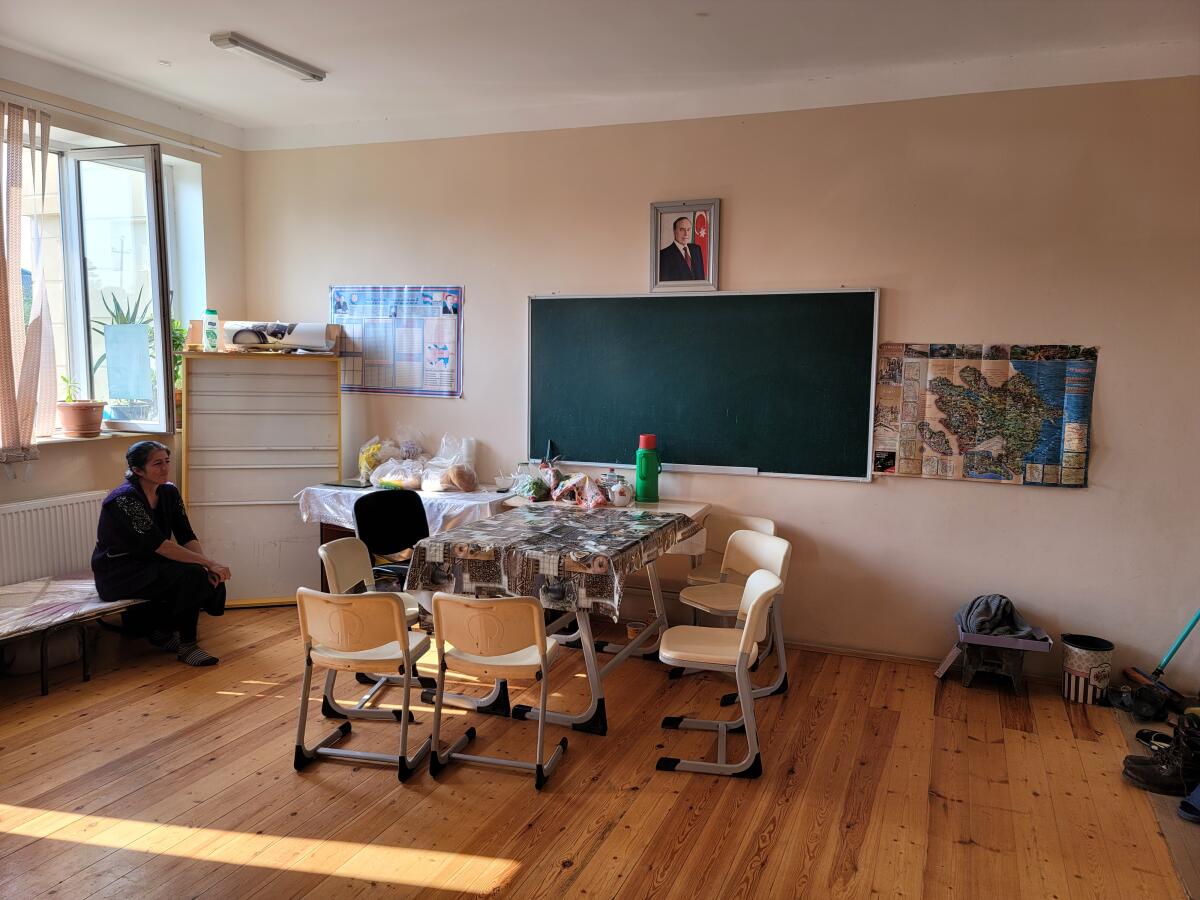
But at the mention of the fighting, Hassanov brightens.
“We’re happier than ever. We think we’re almost there. We rely on the army and believe in it,” he said of Azerbaijan’s new attempt to regain Nagorno-Karabakh.
“We never lost hope to return, no matter how — and are even more hopeful than ever that we’ll go back.”
The hostilities raging in Nagorno-Karabakh lie at the heart of a decades-long fight that began during the chaotic breakup of the Soviet Union.
The clashes have defied repeated attempts at a cease-fire, killed more than 1,000 and put both Armenia and Azerbaijan on the path to all-out war. The fighting has also enmeshed other countries, including Turkey, a North Atlantic Treaty Organization member and Azerbaijan’s top ally, and Russia, which for decades had managed to freeze — but never solve — the conflict even as it sold weapons to both sides.
In Azerbaijan, the war never seems far. Its slogan — “Karabakh is ours, Karabakh is Azerbaijan!!!” — is omnipresent. Arriving in the capital, Baku, you see it the moment you walk off the plane, plastered on screens and signs lining the concourse; on buildings and cars as you drive along the city’s boulevards; on the country’s tricolor flag; on banners above grocery store shelves; on ATM screens in cities miles away from the front lines.
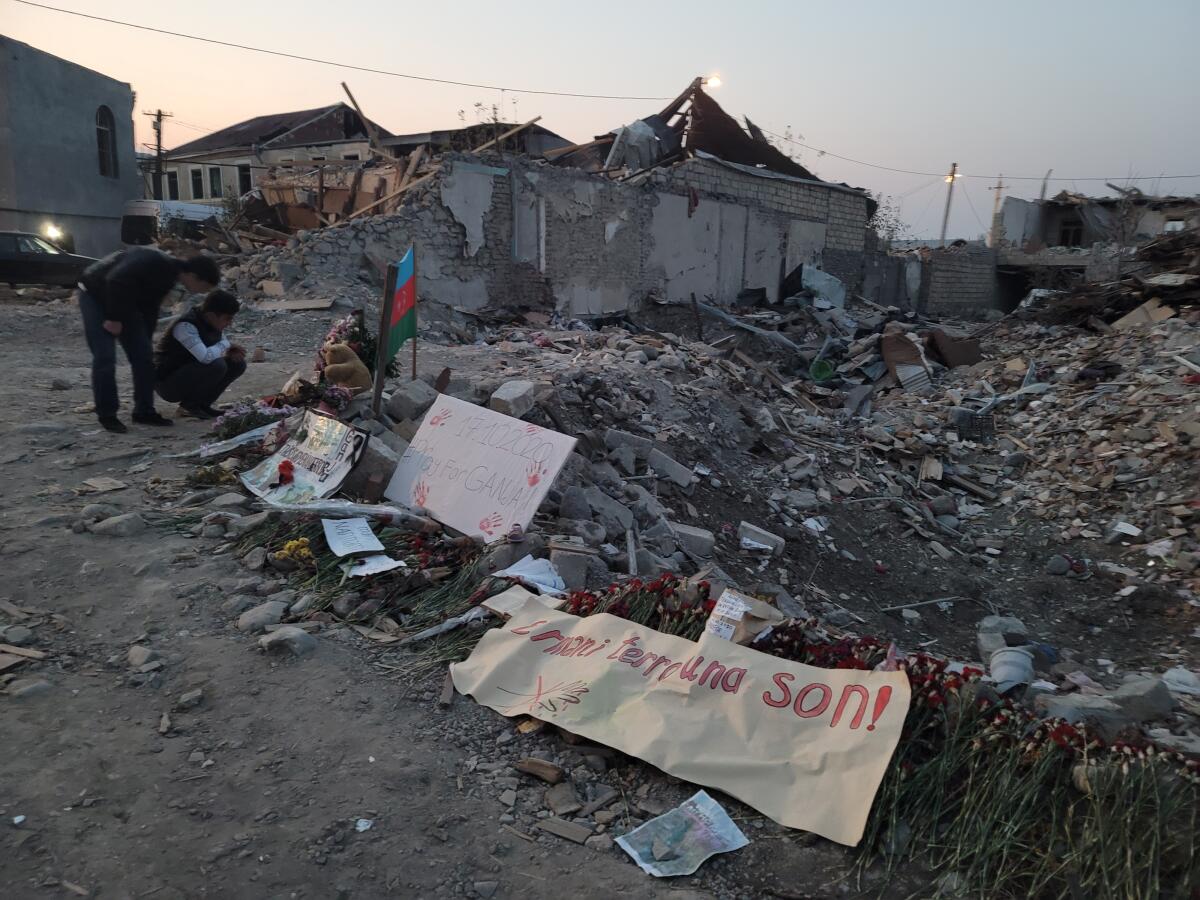
For those displaced from Nagorno-Karabakh and its surrounding areas, who now number more than 1 million people spread among schools, dormitories and other temporary housing throughout Azerbaijan, it’s a reckoning long overdue.
“We don’t want another cease-fire. We’re only thinking of moving forward. Here in this school we feel like we’re in a cage,” said Hassanov’s wife, 54-year-old Rana.
A woman with no-nonsense eyes and more than a few streaks of gray in her dark hair, she spoke of her son, a captain in Azerbaijan’s army, who was now fighting near their hometown. Like most people here, she had obsessively watched for news of the army’s advance to see if her town had been retaken.
“My son was 4 years old when he left Kalbajar. I’m proud he grew up to fight the enemy and liberate our motherland,” she said, adding that her son had promised to send them photos of Kalbajar the moment troops entered. “He’s even happier than we are to see the place where he was born.”
Hers is not a minority opinion. Well beyond the displaced population, in a country where dissent is a prosecutable offense and activists routinely face harassment and imprisonment, there is widespread support for the war, said Altay Goyusov, a prominent historian and political commentator.
“Of course it’s important for the government to take back the lands; it gives it a boost to protect its power. But at the same time there is pressure on the government from the public side,” he said.
“We can say in this case, for the first time since [President Ilham] Aliyev came to power, there is a kind of unity, and people are somehow mobilized behind him. Even the opposition parties — all of them are pro-war, without exception.”
Some Armenian Americans in Southern California have traveled thousands of miles to help in the war effort against Azerbaijan.
Over the years, as repeated convulsions of fighting were smothered into uneasy cease-fires, there were Azerbaijani voices that counseled peace, that blamed the government for using the fight over Nagorno-Karabakh to paper over the ruling elite’s abuses.
That changed in July, when skirmishes broke out on the Azerbaijan-Armenian border, dozens of miles away from Nagorno-Karabakh, which is ruled by a separatist government backed by Armenia. The clashes killed a dozen Azerbaijanis, including soldiers, officers and at least one civilian, and five Armenian soldiers.
In the aftermath of the violence, tens of thousands of infuriated Azerbaijanis marched through Baku and stormed the parliament.
“We were surprised. It completely changed the public mood,” said Hikmat Hajiyev, who advises Azerbaijani’s president on foreign policy. “The Armenians crossed a red line ... and the new generation wanted to get rid of this humiliation.”
Zaur Shiriyev, the South Caucasus analyst for the International Crisis Group, said the public anger “was a signal people were unhappy, that they were demanding the government deliver something, not keep the track of the negotiations without result.”
As the conflict has spread beyond the front lines — with both sides lobbing shells, missiles and even, rights groups say, cluster bombs into civilian areas — and reports of war crimes mount, that support has hardened.
Nizami Aghayev holds back angry tears as he recounts a recent attack that hit Seyidler, a village of squat farmhouses and barely-there dirt roads about 14 miles north of Ganja, Azerbaijan’s second-largest city. About 60 miles from the front line in Nagorno-Karabakh, Ganja was a recent target of what authorities say was an Armenian missile attack. Armenia denies responsibility.
“We were sleeping, but we felt the explosion in Ganja and it woke us up,” Aghayev, a 56-year-old farmer, said.
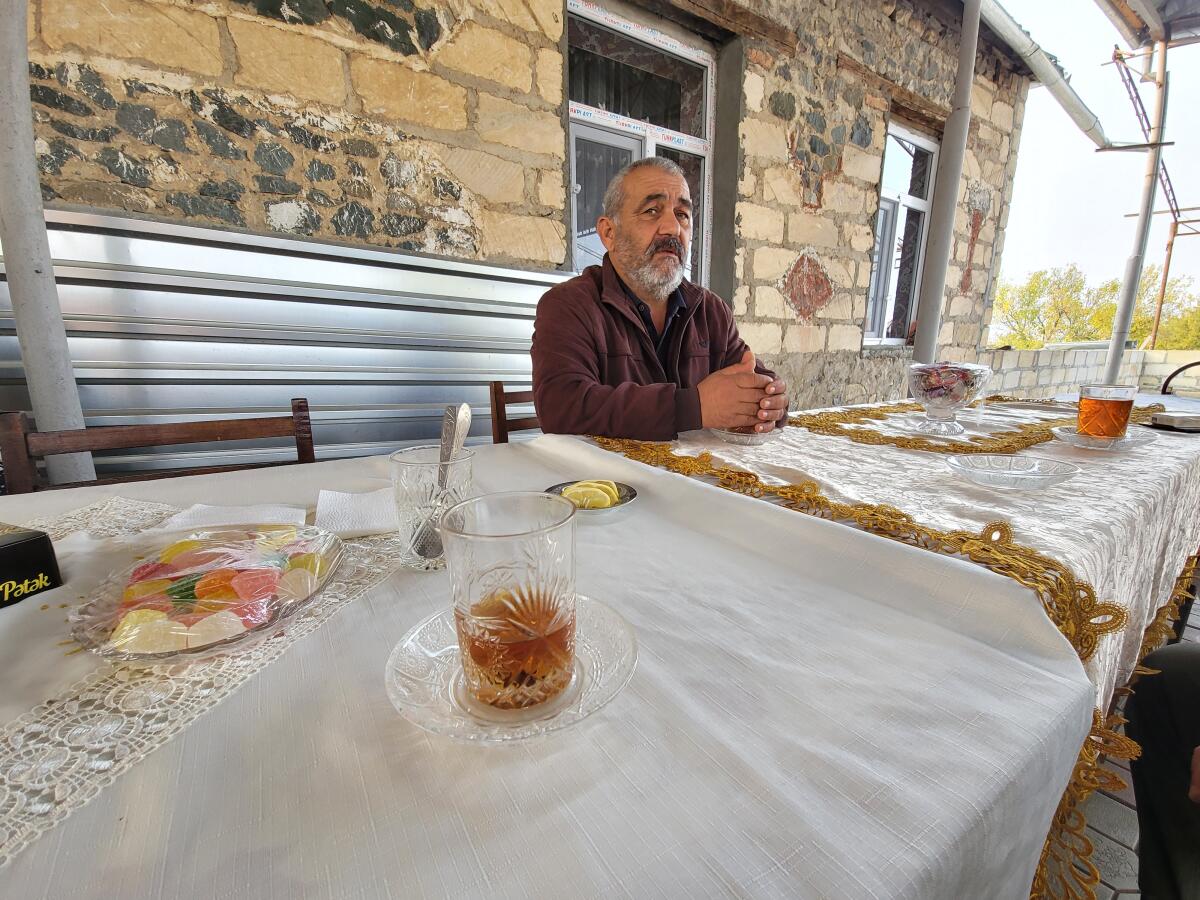
The barrage killed his daughter, Zulaykha Shahnazarova, along with his son-in-law and 16-month-old granddaughter. Only 3-year-old Khadija survived the onslaught.
“She doesn’t understand what happened. Every day, she asks for her father and mother,” Aghayev said, his voice shaking. “The main battlefield is in Karabakh. What was the purpose of launching a missile at Ganja?”
He had little interest in a cease-fire or negotiations.
“It’s just not possible after what happened. We’ve had 26 years of useless negotiations,” he said. “We used to live with Armenians before. They were in the neighboring village. But it’s impossible now. For me, they’re not civilized people.”
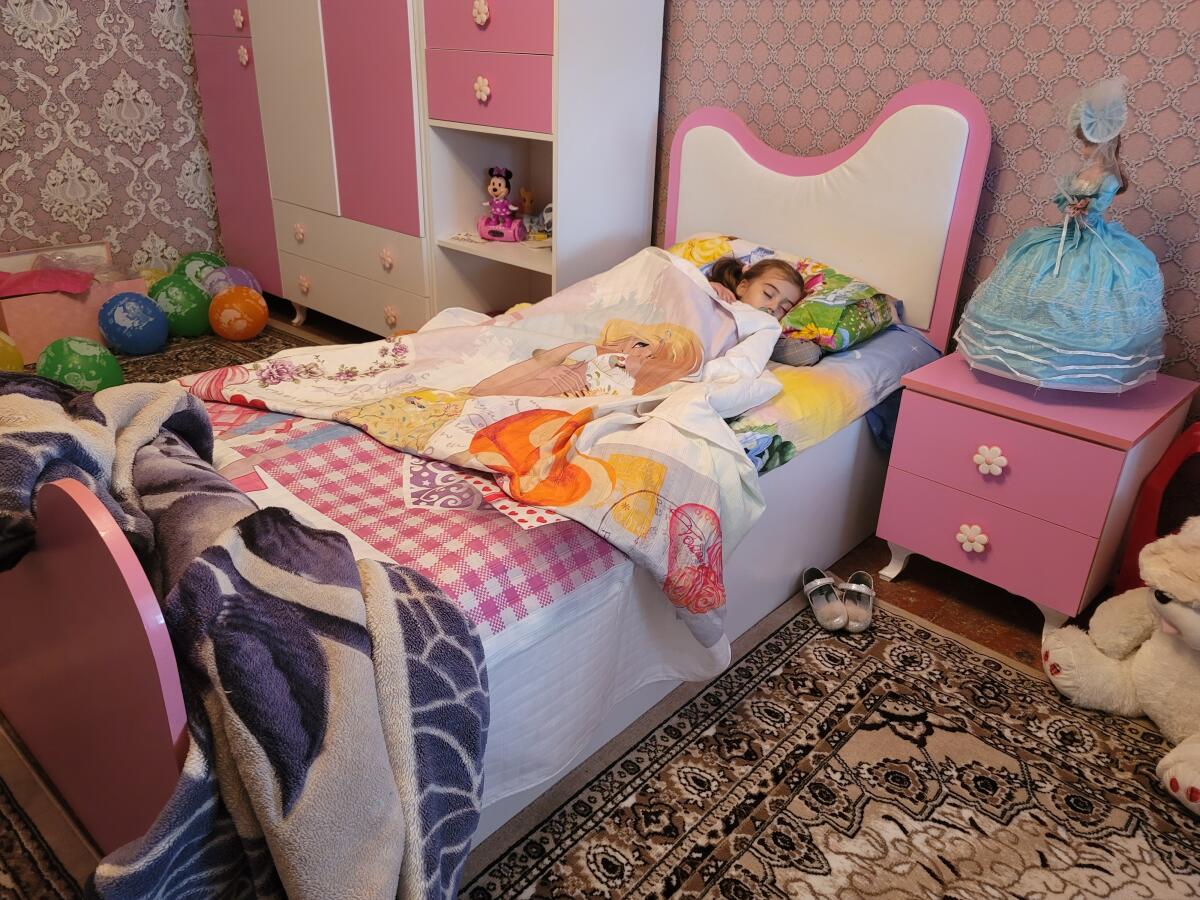
For others, however, the fighting means something besides grief and anger, or even revenge. In their eyes, war signifies hope — of a long-awaited return to homes they abandoned, land they lost, lives they remember.
“There have been other [Azerbaijani army] offensives to take back our lands, but this time we feel it’s different,” said Wafadar Aliyev, 48, a teacher originally from the Armenian-controlled district of Martakert, which Azerbaijanis call Agdere. “Our army has advanced. We believe the government will finish this all the way.”
He now lives in Shikharkh, a settlement of 34 apartment buildings with thousands of displaced near Terter, a city less than 10 miles away from Agdere. Near-daily bouts of shelling by Armenian artillery has forced many of his neighbors to move elsewhere, leaving a skeleton crew of residents — including Aliyev — bunkered in basements to keep watch. But he doesn’t mind.
“Since we believe we’re going back soon, we’re excited,” he said.
“Nothing can discourage us — even being here. We’re preparing to go back home.”
Armenia and Azerbaijan need to return to the negotiating table, so that the deadly conflict in Nagorno-Karabakh does not widen into a regional war.
Beside him stood Aydin Shahverdiyev, a 53-year-old day laborer from Umudlu, a village near Agdere.
“As soon as I step on my land, I’m going to kneel down and kiss it,” he said. “A lot.”
Shahverdiyev had been forced to evacuate by helicopter when his village was encircled by ethnic Armenian forces in 1992. “I didn’t even have time to lock the door,” he said.
Though he expects to find everything there destroyed, he is undaunted about returning.
“We don’t think about the physical difficulties of moving back,” Shahverdiyev said. “It’s our motherland. It’s sweeter than that.”
The military campaign to recapture it has been bolstered by an arsenal that Azerbaijan has spent the last decade upgrading, backed by its oil money. Drones bought from Israel and Turkey have allowed Azerbaijani troops to smash through Armenian forces’ Soviet-era defenses.
Speaking to the Spanish news agency EFE recently, Aliyev, the president, said that four of the five districts Azerbaijan had sought to regain through negotiation were now “liberated, either completely or partially.” On Sunday, he declared that Azerbaijani forces had taken Shusha, a strategic city holding special cultural significance for Azerbaijanis. (Armenians call it Shushi.)
“Dear Shusha, we have returned! Dear Shusha, we will reinvigorate you!” Aliyev tweeted.
The announcement — which Armenia disputed — spurred celebrations in Baku, with drivers on the capital’s main thoroughfares honking their horns and people distributing flowers to passersby.
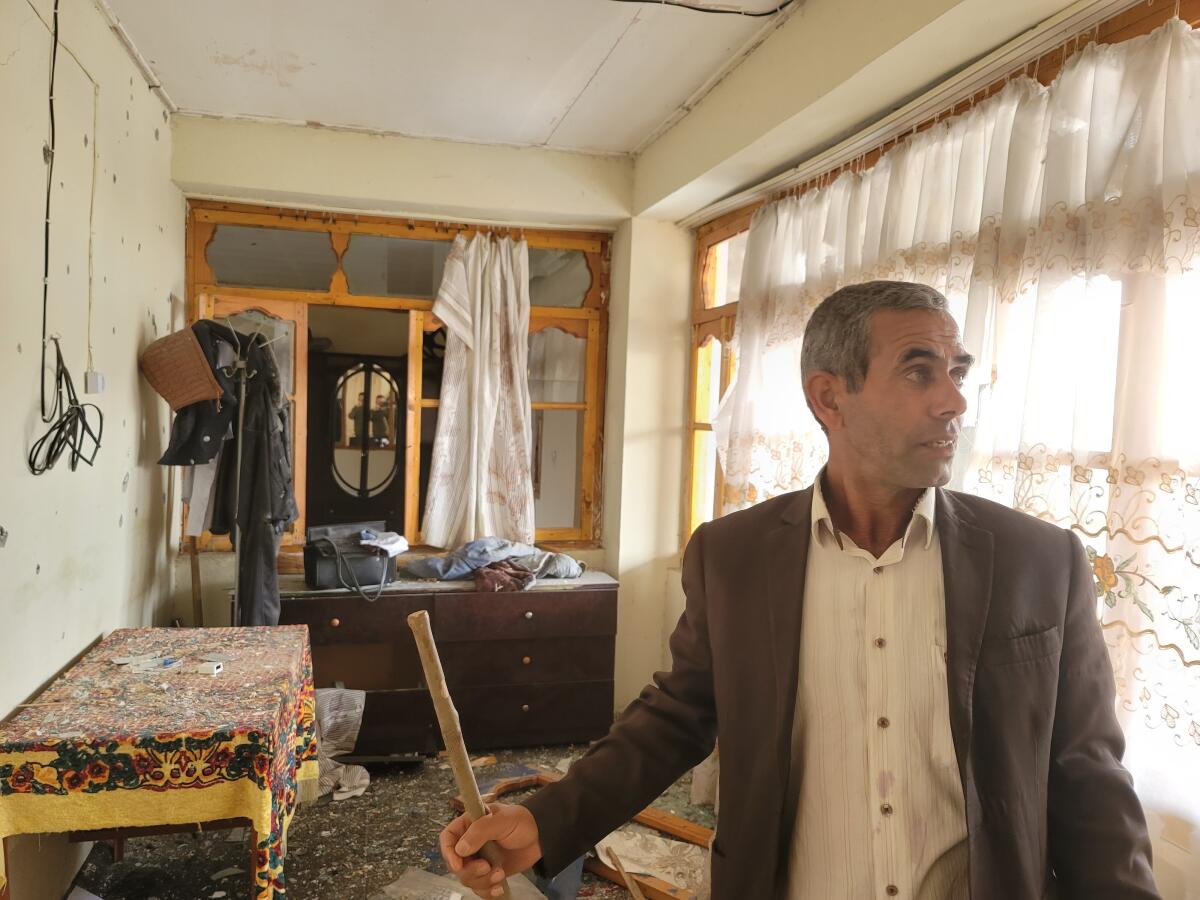
Reasserting Azerbaijani sovereignty over Nagorno-Karabakh can’t come soon enough for 56-year-old Firidun Kadimov, who lives in a government-supplied house in Tezekend, a settlement a few miles away from the trenches along the front line.
On clear days, he said, he goes to a nearby road where he can see the village he was forced to leave more than 26 years ago. He has never lost hope of returning, and now hope has turned to excitement. His home was struck by a missile in the recent clashes, but he doesn’t care.
“I won’t repair this house. I won’t touch it,” he said, then turned his gaze west, where Tagibeyli, his former village, lies.
“I’ll build a new one over there.”
More to Read
Sign up for Essential California
The most important California stories and recommendations in your inbox every morning.
You may occasionally receive promotional content from the Los Angeles Times.
